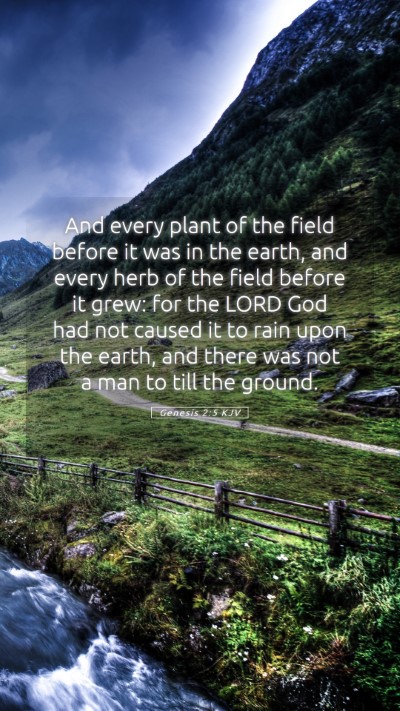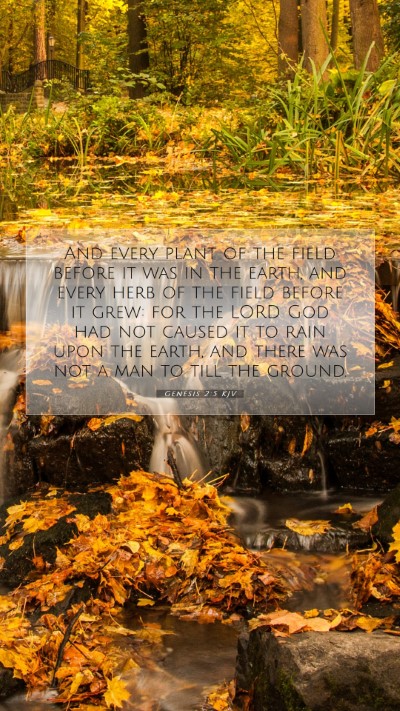Bible Verse Meanings: Genesis 2:5 Explained
Genesis 2:5 states, "And every plant of the field before it was in the earth, and every herb of the field before it grew: for the Lord God had not caused it to rain upon the earth, and there was not a man to till the ground." This verse, while simple on the surface, holds profound significance in the context of biblical teachings and our understanding of God's creation.
Understanding Scripture: Context of Genesis 2:5
The setting of Genesis 2:5 is crucial; it is situated in the account of creation where God is establishing the earth and preparing it for humanity. The commentary by Matthew Henry emphasizes the importance of recognizing that God’s creative acts are deliberate and purposeful. In this moment before the creation of mankind, the earth was in a state of potential, waiting for the bringing forth of life and cultivation.
Bible Verse Commentary: The Significance of Absence
According to Albert Barnes, the verse highlights the absence of human stewardship upon the earth. It was not raining, nor was there a cultivator—this signifies a world that was unrefined and waiting for human involvement. Adams Clarke expands on this by suggesting that God’s creation, while perfect in design, lacked completion in functionality which necessitated man's role in agriculture.
In-depth Bible Verse Analysis: The Meaning of Plant Life
-
Plants and Human Dependency: The mention of plants and herbs indicates that human existence is intrinsically linked to nature. Clarke asserts that this illustrates humanity’s dependence on God’s provision and the earth’s resources.
-
The Role of Rain: The absence of rain is also significant. It speaks to the theme of divine provision and timing. Henry mentions that God's intention was for man's work to initiate the growth of vegetation, which leads to the understanding that cooperation with God is essential in the human experience.
Bible Study Insights: Theological Implications of Genesis 2:5
The theological implications are vast. This verse can serve as a reminder that God is sovereign in both creation and sustenance. As we engage with this scripture, understanding God’s methodologies in creation provides insight into His governance in our lives. The interplay of divine sovereignty and human responsibility is a recurring theme in many biblical narratives.
Application of Genesis 2:5 in Daily Life
Reflecting on the absence of man in Genesis 2:5, one can apply this in understanding our roles in the world today. Just as the earth needed a steward for cultivation, we are called to care for our environment and the resources God provides. This principle can extend to various aspects of life, reminding us of our responsibility towards creation.
Related Bible Cross References
- Genesis 1:29: God provides for humanity's needs.
- Psalms 104:14-15: God nourishes His creation.
- 2 Corinthians 9:10: God supplies seed to the sower.
Conclusion: Understanding Difficult Bible Passages
Genesis 2:5, when examined with care, reveals much about God's intentions for creation and humanity's role within it. Through biblical exegesis and various commentaries, we gain a deeper understanding of scripture that not only enriches our knowledge but also enhances our spiritual journey. As we study this verse, we recognize the essential harmony between God's creation and our call to stewardship.


